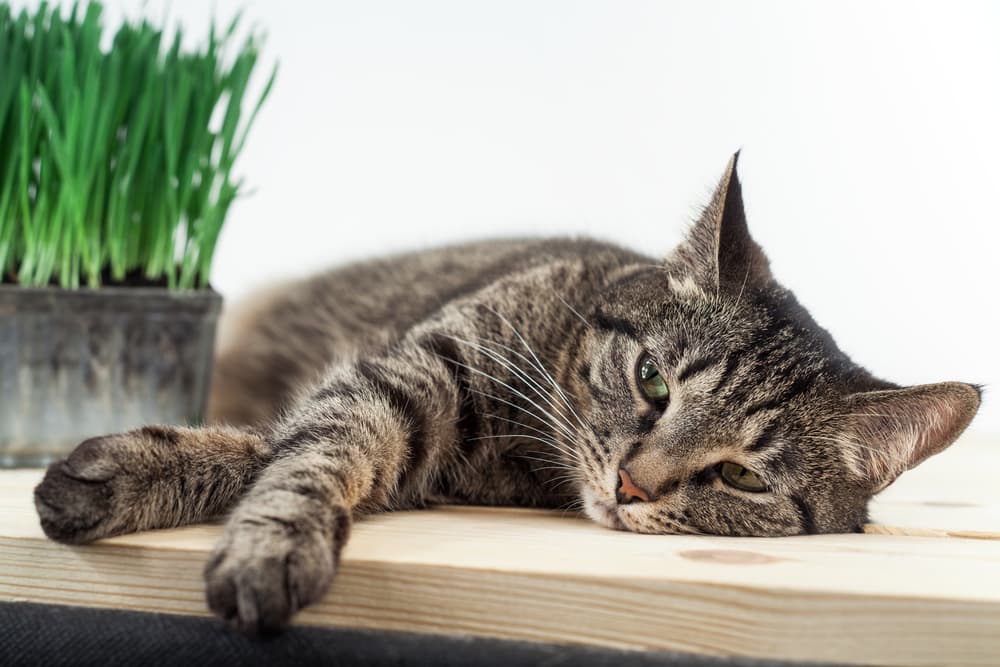Roundworms in Cats

Overview
- Roundworms can impact all cats but are most common in cats that spend time outdoors.
- Cats become infected by ingesting roundworm eggs or other infected hosts (such as rodents or birds).
- Cats can pass along roundworms to humans via infected soil, sand, or feces.
- Symptoms of roundworms in cats include diarrhea, vomiting, weight loss, and more.
- Your veterinarian will typically recommend fecal floatation or fecal antigen tests to diagnose infection.
- Medication is the most common treatment for roundworms in cats.
Roundworms are an extremely common parasite in cats of all ages. According to the Companion Animal Parasite Council, more than 25 percent of cats have tested positive for roundworms in recent studies. Roundworm infections are most common in kittens and cats allowed outdoors or allowed to hunt, but all cats are susceptible.
Treatment of roundworms in cats is essential in order to prevent complications and stop the shedding of roundworm eggs into the environment.
What Are Roundworms?

Roundworms are large, round, parasitic worms that live in the small intestine of infected cats. The most common roundworm species in cats is Toxocara cati, though infection with other species is also possible.
How Do Cats Get Roundworms?
Cats become infected with roundworms by ingesting roundworm eggs from the environment, or by ingesting other vertebrate hosts that are infected with roundworms, such as birds and rodents. Kittens can also be infected with roundworms while nursing. However, unlike dogs, which can be infected in utero, kittens cannot be infected with roundworms prior to birth.
After a cat ingests roundworm eggs, the roundworm larvae migrate through the liver and lungs before making their way back to the small intestine, where they develop into adult worms.
This migration may result in pulmonary disease, irritation of the stomach that induces vomiting, and inflammation of the intestines, which can cause diarrhea. However, many cats infected with roundworms are asymptomatic, particularly adult cats.
Can Humans Get Roundworms from Cats?
Yes, humans can be infected with roundworms. Infection is most common in children and most often occurs due to infected soil at playgrounds or parks, or in sandboxes.
Parents should make sure that children are not eating dirt and are not playing in areas where pets may have defecated. Infected cats shed roundworm eggs in their feces, so it is very important to clean up feces promptly and practice good hygiene, such as frequent handwashing.
Can You See Roundworms in Cat Poop or Vomit?
You may see adult roundworms in cat vomit. These worms are recognizable as being large, light tan in color, and having three prominent lips on one end. In general, however, pet owners typically do not see roundworms in cat poop or vomit.
Roundworm eggs are shed in the feces of an infected cat, but these eggs are microscopic and cannot be seen with the naked eye. This is why routine fecal testing for parasites is very important to diagnose infections in cats that may otherwise be missed.
Symptoms of Roundworms in Cats

As stated above, many cats with roundworm infections, particularly adult cats, are asymptomatic. This means that these cats can be shedding roundworm eggs into their environments without their owners ever realizing there’s a problem.
When cats do develop signs of roundworm infection, symptoms can include:
- Diarrhea
- Vomiting
- Weight loss
- Poor hair coat
- Pot-bellied appearance
- Failure to thrive
- Intestinal obstruction
- Sudden death
Diagnosing Roundworms in Cats

To diagnose a roundworm infection in your cat, your veterinarian may recommend some or all of the following tests:
Physical Examination. Your veterinarian will perform a comprehensive head-to-tail physical examination on your cat, including palpating your cat’s abdomen, checking their weight, and assessing their hair coat.
Fecal Floatation. Your veterinarian may recommend assessing a sample of your cat’s feces for the presence of roundworm eggs. Presence of eggs indicates a roundworm infection. False negatives may occur in some cases.
Fecal Antigen Testing. This test uses a sample of your cat’s feces to detect an antigen produced by both young and adult roundworms in your cat’s small intestine. Because it is not dependent on egg production, false negatives are less common than with fecal floatation testing. This test is typically performed in combination with a fecal floatation test.
Roundworm Treatment for Cats
Roundworms in cats can become severe enough to cause intestinal obstruction or even death, particularly in young kittens. It is important to treat a roundworm infection for the health of your cat and to prevent transmission of roundworms to other pets and people in the household.
Cat roundworm treatment typically consists of a prescribed medication to be taken for a certain period of time.
Roundworm Medicine for Cats
A number of deworming medications are effective against cat roundworms. Your veterinarian may prescribe medications such as:
- Fenbendazole
- Milbemycin
- Moxidectin
- Pyrantel pamoate
The dosage and duration of treatment will depend on the medication and the size of your cat. Treatment may be repeated at 2-3 week intervals to ensure the infection is cleared.
General Cost to Treat Roundworms in Cats
Fortunately, treatment for roundworms in cats is relatively inexpensive. Pet owners can expect to spend $20-$75, depending on the type of medication prescribed and the duration and frequency of the treatment.
How to Prevent Roundworms in Cats

There are a few ways to prevent roundworms from becoming an issue in your cat.
Kittens should be dewormed at 2, 4, 6, and 8 weeks of age, and then monthly until 6 months of age. Cats over 6 months of age should be treated with parasite control products effective against roundworms monthly.
Promptly cleaning up feces and stopping ingestion of prey animals can also prevent a cat roundworm infection.









